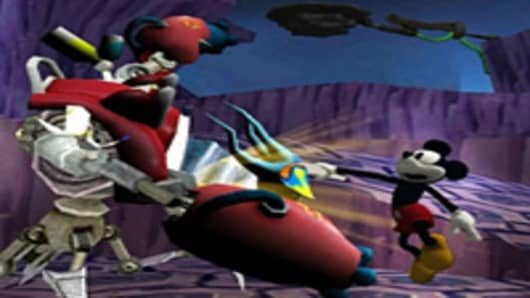"As part of setting a strategic direction for future success in the digital media space, the Disney Interactive Media Group yesterday began a restructuring process," the company told CNBC Monday.
The suddenness of the move caught the gaming world by surprise, but many insiders have been waiting for action of some kind as Disney has, in large part, distanced itself from traditional games for the majority of the past year.
The shift started in late July 2010, when Disney acquired online game company Playdom for a breathtaking $763 million. That remains the highest price paid for a company focusing on the social games space, topping Electronic Arts' earlier purchase of Playfish for $400 million in late 2009.
The first sign of the change came in September, with the abrupt departure of Disney Interactive Media Group head Steve Wadsworth. Disney quickly replaced him with John Pleasants, CEO of Playdom, and Yahoo veteran Jimmy Pitaro.
In November, the shift continued as Graham Hopper, who had guided Disney’s gaming division for the past eight years and had built the company into a viable force among publishers, announced his departure.
“By putting John Pleasants in to run games, not only will he focus on turning those businesses into profitability, but diversifying our presence in the business, so we’re not reliant on one platform that’s obviously facing challenges," said Disney CEO Bob Iger in a conference call at the time. "It’s our goal not only to be profitable, but obviously to get there by shifting our investment."
Playdom, at the time of its purchase, was the industry’s third largest developer of social games, behind Zynga and Playfish, with 42 million active users. Disney was said to be interested in the company chiefly to expand its existing brands and characters into social games.
But soon after ink dried on the deal, it became clear that the plan was actually much broader—and meant a change to the company’s entire approach to gaming.
“Pirates of the Caribbean: Armada of the Damned,” in which Disney had invested millions of dollars and which was far along in the development cycle, was cancelled without explanation. The development studio behind it was downsized—and shuttered for good late last week. All totaled, approximately 170 people were put out of work by those decisions.
The ongoing shift to digital at Disney comes as Disney recently celebrated one of the fastest selling games in its history.
“Epic Mickey,” a video game re-branding, of sorts, for the company’s most famous character, sold 1.3 million units in December—a respectable number by any count. Despite the achievement, though, some insiders were said to be hoping for more.
Analysts who cover the video game space, say the reason sales weren’t higher was because of Disney’s decision to only release the game on the Nintendo Wii—and because it came out on Nov. 30—which is very late for a holiday video game title.
Junction Point, which made “Epic Mickey” was not spared from Monday’s layoffs, but it’s presently unclear how deep the cuts were at that studio.


